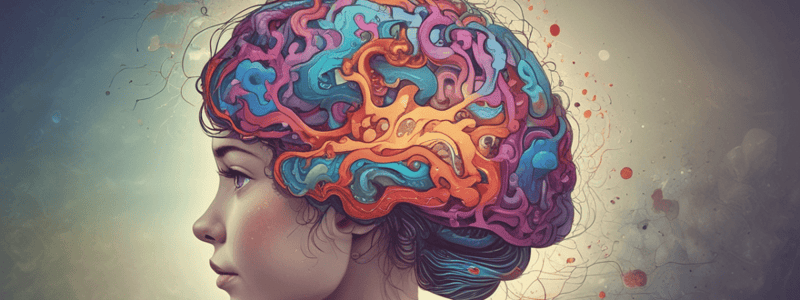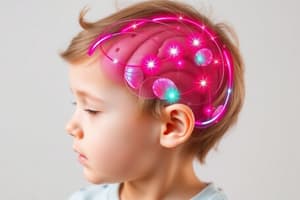Podcast
Questions and Answers
What are the 4 stages into which neurodevelopment can be divided, along with key developmental milestones in each stage?
What are the 4 stages into which neurodevelopment can be divided, along with key developmental milestones in each stage?
The 4 stages are: Gross motor, Fine motor/vision, Hearing/speech/language, and Social. Key developmental milestones include: Holding head up, turning over, sitting, crawling, walking, running, hopping (Gross motor); Fixing, fixing and following, grasping, pincer grip, using pencil (Fine motor/vision); Stills to bell, turns to sound, knows name, babbles, says words, puts words together (Hearing/speech/language); Smiling, stranger wariness, feeding self, toilet trained, dressing self (Social).
What are some human abilities at birth?
What are some human abilities at birth?
Breathing, sucking and swallowing, knowing when hungry, bladder full, rectum full, making sounds to respond to pain, maintaining blood pressure and blood CO2 levels.
What are some human abilities at 6 weeks of age?
What are some human abilities at 6 weeks of age?
Smiling, turning head to track objects, responding to sounds.
What are some human abilities at 1 year of age?
What are some human abilities at 1 year of age?
Describe the characteristics of development mentioned in the content.
Describe the characteristics of development mentioned in the content.
Describe the brain and peripheral nervous system changes during foetal life and the first year of life according to the text.
Describe the brain and peripheral nervous system changes during foetal life and the first year of life according to the text.
Flashcards are hidden until you start studying
Study Notes
Human Development
- Human infant's functional immaturity fosters dependency on parents and society, leading to nurturing.
Developmental Processes
- 3 interrelated processes govern development: neurological devices, sensory devices, and effector units, which interact to alter environmental input and change sensory devices.
Stages of Neurodevelopment
- 4 stages of neurodevelopment:
- Gross Motor Stage:
- Holds head up
- Turns over
- Sits
- Crawls
- Walks
- Runs
- Hops
- Fine Motor/Vision Stage:
- Fixes (gaze)
- Fixes and follows
- Grasps
- Pincer grip
- Uses pencil
- Hearing/Speech/Language Stage:
- Stills to bell
- Turns to sound
- Knows name
- Babbles
- Says words
- Says words together
- Social Stage:
- Smiles
- Displays stranger wariness
- Feeds self
- Toilet trained
- Dresses self
Developmental Milestones and Age
- See image for a detailed table of developmental milestones and corresponding ages
Human Abilities at Birth
- Breathe
- Suck and swallow
- Recognize hunger, bladder fullness, and rectum fullness
- Responds to pain with sound
- Maintains blood pressure and blood CO2 levels
Human Abilities at 6 Weeks
- Smiles
- Turns head to track objects
- Responds to sounds
Human Abilities at 1 Year
- Says first words
- Distinguishes between friends and strangers
- Becomes mobile
- Advances hand function
Characteristics of Development
- Innate: naturally inbuilt
- Incremental: one skill builds upon another
- Progressive: skills should never be lost
- Responsive: to stimuli
- Interdependent: one area of development affects others
Studying That Suits You
Use AI to generate personalized quizzes and flashcards to suit your learning preferences.





